
Some people love it, and some people hate it. Some of y’all might hate ME for making you lose the game… or you might hate me for bringing up an annoying “overdone” internet fad.
HOWEVER, there is actually something extremely significant about the game and human psychology. I thought y’all might find that interesting!
.
I think you should get a pass as far as winning/losing the game goes while you are reading this.
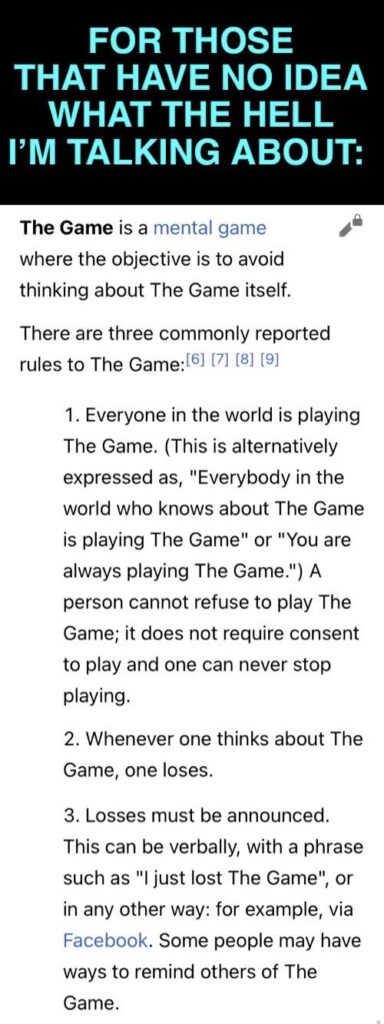
Wikipedia gives a stellar definition of The Game: https://en.wikipedia.org/wiki/The_Game_(mind_game)?wprov=sfti1
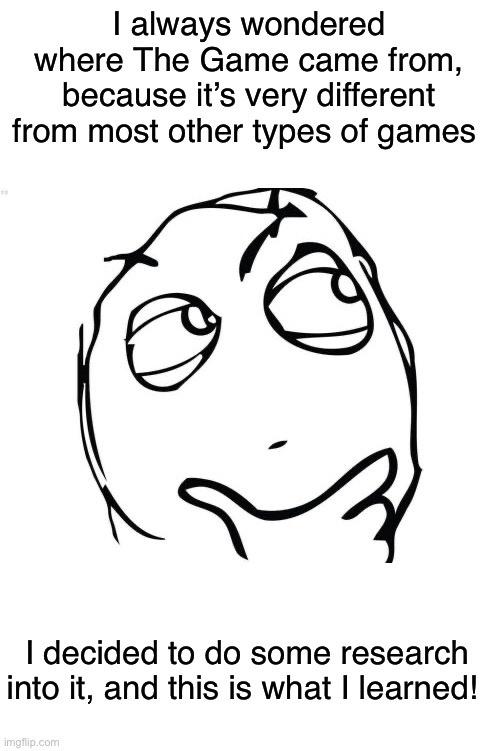
The Game always struck me as odd, because of its exclusivity. Nobody else knows what the hell it means when you say “I lost the game.” I thought of it as like this underground society of people who occasionally remind each other of two words: “the game.”
I wanted to learn more about it, and I was surprised to find that it connected to the psychological phenomenon of ironic process theory. Then I felt like an idiot for not putting that one together, but I digress.
I learned a good bit about psychology in game theory as well.

Game theory is the science of strategy. In a game, or even life in general, humans make strategic choices in order to achieve an objective. Some of these choices involve logic and math, and other choices rely on psychology.
Game theory studies how humans make these choices in games, where the objective is to gain something.
I couldn’t find anything that mentions creating a game with the explicit purpose of NOT using game theory, so I’m fairly certain that’s a myth.
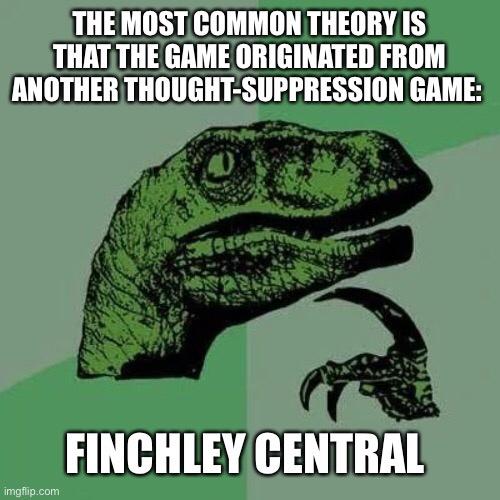

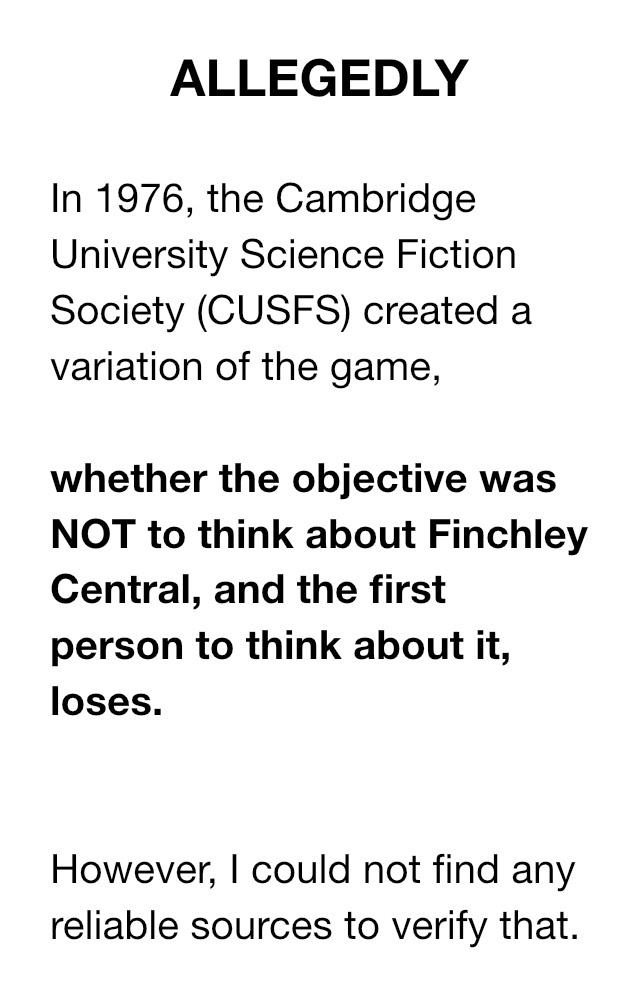

To my understanding, traditional game theory is the study of making choices to achieve an outcome. A thought-suppression game flips the rules upside down, because you are already making the winning choice:
NOT think about it.
When you think about it, you have lost the game. This choice is not something conscientious, and it relies almost entirely on psychology, rather than mathematical strategy.
.
.
PS – I’m sorry if this meme is terrible in quality. I tried my best.
I would also LOVE IT if any expert on game theory added their own perspective!
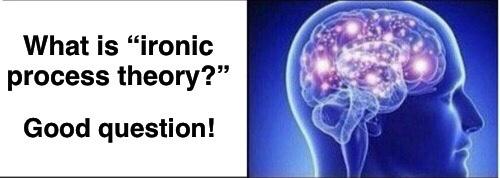

“Ironic process theory” is sometimes also known as “white bear theory,” due to how it was studied. Dr. Daniel Wagner first thought of it when reading “Winter Notes on Summer Impression,” an account of Fyodor Dostoevsky’s travels in Western Europe in 1863.
Fyodor wrote an interesting paragraph:
“Try to pose for yourself this task: not to think of a polar bear, and you will see that the cursed thing will come to mind every minute.”
.
Dr. Wagner was especially struck by this statement, and decided to do a psychological experiment to explore this phenomenon further.
He had two groups of people. Both were told to sit at a table for five minutes.
1.) One group was instructed to think about white bears.
2.) The second group was instructed to NOT think about white bears.
If a white bear came to mind in the second group, he told them to ring a bell. The results showed that the participants thought about the white bear more than once per minute, on average.
Then he made things interesting.
He instructed both groups to think about white bears. The second group of people thought more about white bears than the group of people who were told to think about white bears in the beginning.
The results suggested that repressing thoughts causes them to come back into a person’s mind with more power later on.
Originally, the white bear theory was used to understand intrusive thoughts and improve treatment options for those suffering with Obsessive-Compulsive Disorder.
Then it also became a game.

The Game’s goal is to NOT think about the game. You are winning if you don’t think about it, so you are winning on default.
Just like in Dr. Wagner’s white bear experiment, you “ring a bell” when you think about the game – which ultimately means that you make everyone else around you think about it too.
Whether you think it’s a FUN game is another question entirely, but that’s how it works!
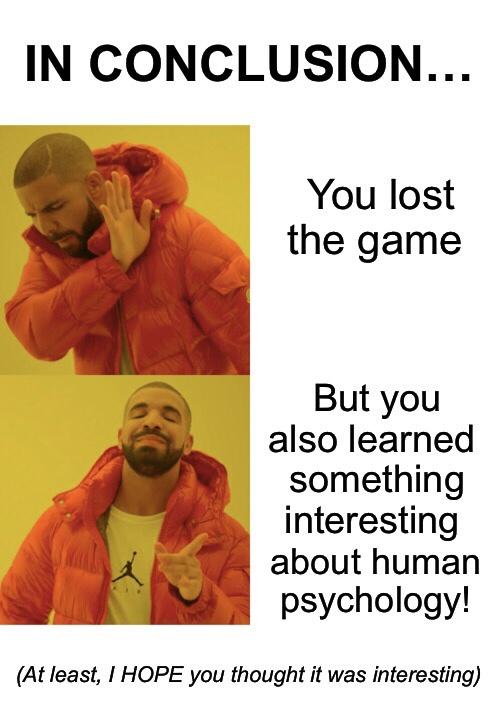
I hope you found this interesting!

SOURCES CITED
Here’s the article on the Finchley Central Game and Game Theory: http://www.losethegame.net/img/ManifoldPandora.pdf
Here’s an article about the development of ironic process theory: https://www.apa.org/monitor/2011/10/unwanted-thoughts
Link 2 on ironic process theory: https://elevatecounselingaz.com/dont-think-of-a-pink-elephant/
This is an article I found on The Game, but I did not entirely trust its sources: https://thenextweb.com/news/you-just-lost-again
About game theory: https://www.econlib.org/library/Enc/GameTheory.html